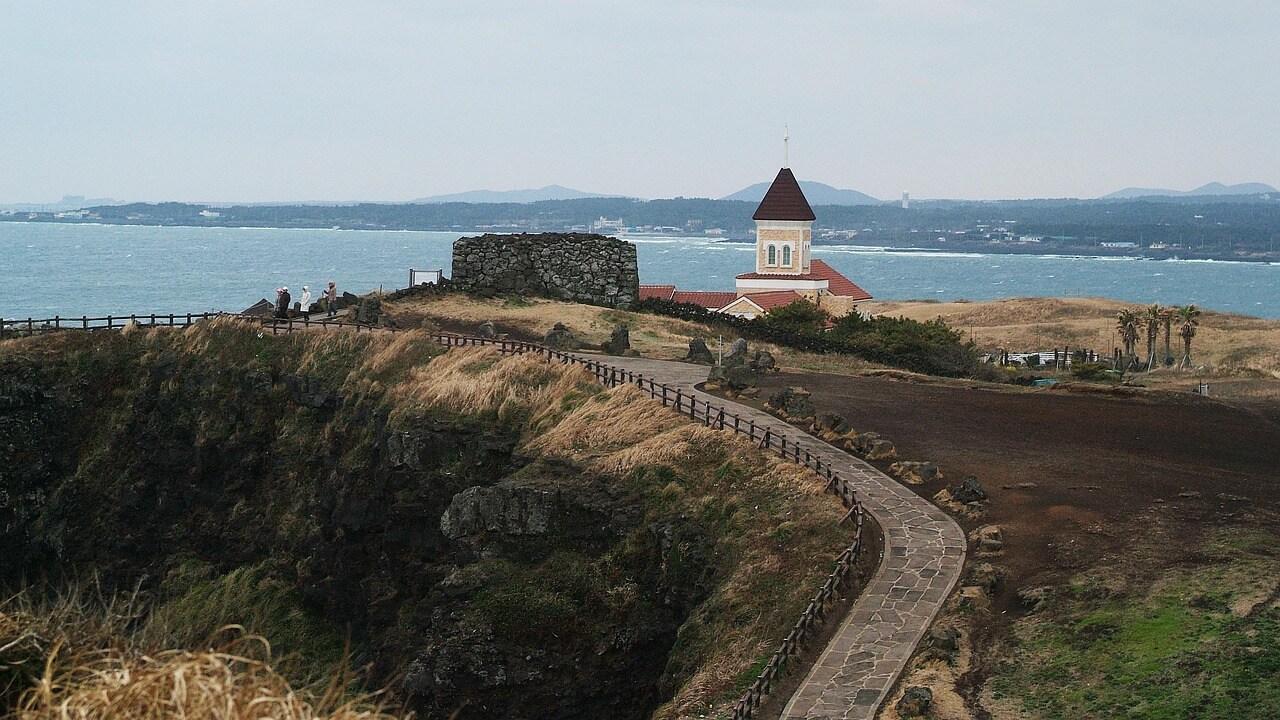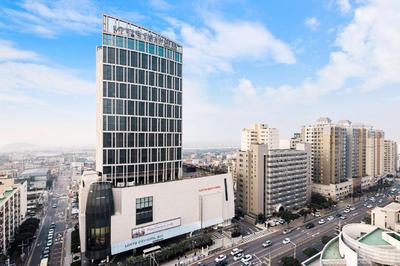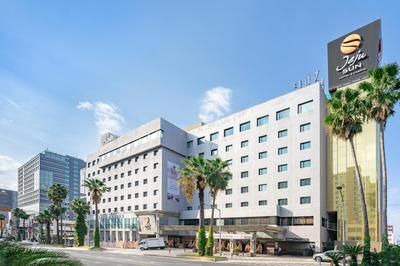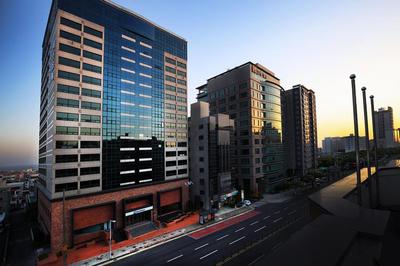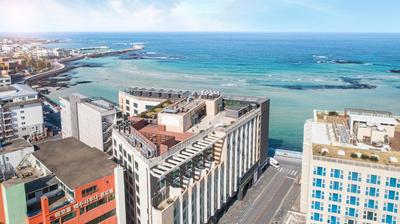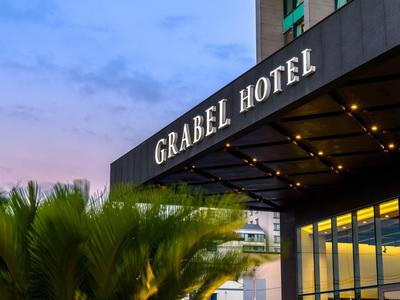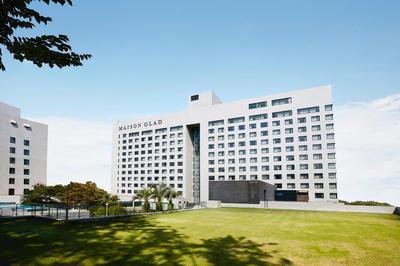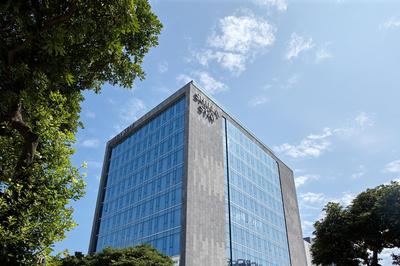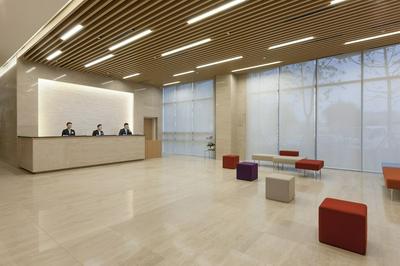When to visit Jeju Island?
Jeju Island boasts a mild climate, making it a year-round destination, but the ideal time to visit largely depends on what you want from your trip. Spring (April to June) is a popular time to witness the island's stunning cherry blossoms and vibrant fields of canola. The weather is pleasantly warm, perfect for outdoor activities and sightseeing.
Summer (July to August) brings the highest tourist influx, as people flock to enjoy the island’s famed beaches like Hyeopjae and Jungmun. While temperatures can reach the high 30s°C (around 90°F), the ocean breeze provides relief. However, be prepared for occasional summer rains and potential typhoons.
Autumn (September to November) transforms Jeju into a colorful canvas with autumn foliage. This season offers mild temperatures and clear skies, ideal for hiking trails like Hallasan or enjoying the breathtaking views at Seongsan Ilchulbong Peak.
Winter (December to March) sees less tourist traffic, which means you can explore Jeju's wonders without the crowds. Though it can get chilly, especially at higher elevations, the island still radiates beauty. If you enjoy winter activities, consider a visit to Hallasan National Park, where you can experience snow-covered landscapes.
Overall, each season offers a unique experience on Jeju Island, catering to various interests and activities.
How to get to Jeju Island?
Getting to Jeju Island is quite straightforward, primarily through air travel. Flights from major South Korean cities like Seoul, Busan, and Incheon connect regularly to Jeju International Airport, with journey times averaging about an hour. The airport is well-equipped with facilities and car rental services to aid your arrival.
If you prefer to travel by land and sea, ferries operate from the mainland, particularly from Mokpo and Busan to Jeju. The ferry ride can take anywhere from 12 to 17 hours, depending on the service, but it offers a scenic experience.
Once on the island, local transportation options include buses and taxis. Public buses serve most of the island’s major attractions. However, renting a car is popular among visitors to ensure flexibility in exploring Jeju's spectacular coastline and rural areas.
Tourist activities in Jeju Island
Jeju Island is a playground for adventurers and culture enthusiasts alike. Start your day with a hike to Hallasan Mountain, South Korea's highest peak, where trails wind through diverse landscapes. The stunning views from the summit are well worth the effort!
If you're interested in local culture, visit historic sites like the UNESCO World Heritage-listed Seongsan Ilchulbong (Sunrise Peak) and the beautifully preserved Manjanggul Lava Tube. For a relaxing afternoon, unwind at one of the stunning beaches. Hyeopjae Beach, with its crystal-clear waters and soft sand, is perfect for swimming and sunbathing.
Nightlife on the island is relaxed, with an array of bars and restaurants where you can taste authentic Jeju cuisine. Be sure to try local dishes like Black Pork BBQ and seafood stews. Markets like Dongmun offer a lively atmosphere for street food lovers and shoppers alike.
For family-friendly options, both children and adults will love the Jeju Teddy Bear Museum and the eco-friendly theme park, Jeju Eco Land. With so much to explore, each day on Jeju Island provides a new adventure!
Events and festivals
Jeju Island hosts numerous vibrant events and festivals throughout the year, showcasing its unique culture and traditions. One of the most notable is the Jeju Fire Festival, held every March. This exciting event features traditional fire rituals, performances, and even a large bonfire to signify the arrival of spring.
In May, be sure to check out the Jeju Cherry Blossom Festival where stunning cherry blossoms bloom, attracting visitors from around the country for picnics and enjoying local performances.
The Jeju Olle Walking Festival in October is another highlight, celebrating the island’s scenic walking paths. Participants can walk various routes while enjoying cultural events and local cuisine.
Additionally, the Jeju International Windors Festival in November features international artists and celebrates wind music, offering a unique cultural experience.
These events provide opportunities to immerse yourself in Jeju’s rich heritage and create lasting memories while enjoying the local culture.
Family and kids activities
Jeju Island is an excellent destination for families with children, providing a mix of adventure, education, and fun. Start at the Jeju Resort Aqua Planet, a huge aquarium with captivating marine shows and interactive exhibits that captivate young visitors.
For nature-loving families, the Jeju Stone Park offers a chance to explore fascinating stone sculptures and learn about the island’s geological history. Children will also enjoy the Hallim Park, where they can engage with gardens, a mini zoo, and even a lava cave!
A visit to the teddy bear museum is a must for youngsters, featuring an array of creatively themed teddy bear displays. Another fun spot is the Jeju Loveland, a unique sculpture park with playful art installations that provide plenty of photo opportunities for the family.
Parks are plentiful on the island, with various playgrounds and family-friendly activities. The beaches are ideal for building sandcastles or splashing in the waves, making for a perfect family day out!
What to see in Jeju Island?
Jeju Island is brimming with must-see attractions that highlight its natural beauty and cultural heritage. Here’s a list of key sites you won’t want to miss:
- Hallasan National Park: Hike up South Korea’s tallest mountain, Hallasan, known for its stunning views and diverse ecosystems.
- Seongsan Ilchulbong: This UNESCO World Heritage site, also known as Sunrise Peak, offers breathtaking sunrise views and a unique volcanic landscape.
- Manjanggul Lava Tube: Wander through one of the longest lava tubes in the world, admired for its impressive natural formations.
- Jeju Folk Village: Experience traditional Korean culture and heritage in this reconstructed village showcasing historic houses and cultural performances.
- Hanok Village: Explore this charming area lined with traditional thatched-roof houses and local artisan shops.
- Cheonjeyeon Waterfalls: A beautiful multi-tiered waterfall framed by lush greenery, perfect for nature lovers.
- Jeongbang Waterfall: The only waterfall in Asia that falls directly into the ocean, providing a unique photo opportunity.
Each of these attractions reveals a different facet of Jeju Island’s enchanting allure.
Accommodation in Jeju Island
Accommodation options on Jeju Island cater to a variety of preferences and budgets. From luxury resorts to cozy guesthouses, there’s something for everyone. For those looking for top-notch amenities, the coastal luxury hotels in the Jungmun area provide stunning ocean views and direct beach access.
Midrange hotels and charming bed-and-breakfasts can be found in Puerto Beach and Jeju City, offering comfortable stays with easy access to local attractions. Boutique accommodations, such as traditional Hanok houses, provide a unique cultural experience along with comfort and hospitality.
For budget travelers, Jeju City has hostels and guesthouses with shared facilities, great for meeting other travelers while keeping costs down. Prices vary greatly: expect to pay anywhere from $30-250 per night, depending on the type of accommodation and season.
Regardless of where you choose to stay, you’ll find Jeju’s vibrant neighborhoods ready to offer their unique charm and hospitality.
Important numbers and information
- Emergency numbers: Fire: 119, Police: 112, Ambulance: 119
- Tourist Information Centers: Jeju City Tourist Information Center (064-728-2777)
- Main Hospitals: Halla Hospital (064-740-1000) for general healthcare.
- Airport Contacts: Jeju International Airport (064-740-1234)
- Public Transport Info: Jeju public transportation website for bus routes and schedules.
- Taxi Apps: KakaoT and Taxis in Jeju City provide reliable taxi services.
- Currency: South Korean Won (KRW); Credit cards widely accepted.
Where to eat?
The food scene on Jeju Island is rich and diverse, showcasing fresh seafood and local ingredients. Must-try dishes include Jjigae (stews), especially seafood stew, and Black Pork BBQ which is famed throughout Korea. Street food is also a huge part of dining culture; try the famous Jeju tangerine and hotteok (sweet pancakes) sold by street vendors.
Seogwipo area is known for its seaside dining, with eateries offering stunning views alongside delectable fresh catches. At the Dongmun Traditional Market in Jeju City, sample various authentic dishes and snacks while browsing local products.
You can find a range of dining options from casual eateries to fine dining restaurants, accommodating all budgets. Expect an average meal price of $5 to $30, making it accessible for all travelers. Don't miss out on tasting the delightful flavors of Jeju!
Nightlife – where to go out?
Jeju Island's nightlife offers a relaxed vibe, perfect for unwinding after a day of exploration. Gangjeong Street in Seogwipo is the heart of nightlife, dotted with pubs and bars that showcase local drinks. One popular spot is "Magpie Brewing Co.," where you can savor craft beers brewed right on the island.
If you're in the mood for live music, head to clubs like "The Lounge," known for its cozy ambiance and vibrant performances. For dance lovers, the "Club ASTA" offers a mix of dance music with an energetic atmosphere.
After midnight, many bars remain open for night owls, providing a cozy atmosphere with sounds of laughter and conversation filling the air. Whether you prefer a laid-back night sipping cocktails or dancing the night away, Jeju's nightlife does not disappoint!
Transport and taxis
Public transport on Jeju Island is accessible and convenient, with buses being the primary mode of transportation. Bus routes are extensive, connecting major attractions, towns, and the airport. Fares typically range from about 1,200 KRW (for short distances) to 2,000 KRW for longer routes.
Taxis are available throughout the island, and you can easily flag one down or use apps like KakaoT for a ride. Taxi fares start at 3,300 KRW, with additional costs per kilometer. It's worth noting that most taxis are comfortable and drivers are usually friendly.
For safety, always ensure the taxi's meter is running, and if you're unsure of the fare, ask beforehand. Renting a car is popular among tourists for flexibility in exploring secluded spots. Many car rental companies operate at the airport and in major towns.
When using public transport or taxis, having your destination written in Korean can be helpful. Here’s a quick bullet list:
- Bus fares: 1,200 - 2,000 KRW
- Taxi starting fare: 3,300 KRW
- Car rental available
- KakaoT recommended for taxi services
Parking and public garages
Parking in Jeju Island is generally easy and convenient, particularly in urban areas. Most tourist attractions offer designated parking zones, with some facilities being free while others charge a small fee, usually around 1,000-2,000 KRW for a day.
In Jeju City and Seogwipo, public garages are available, equipped with easy signage for tourists. It's advisable to plan ahead during peak season when availability might be more limited.
For those renting a car, always check the parking regulations to avoid fines. When parking on the streets, be mindful of signs indicating restricted zones. Overall, Jeju provides straightforward parking options for visitors.
Surroundings of Jeju Island
The natural beauty around Jeju Island extends beyond its borders, making it easy to explore nearby destinations. A short drive from Jeju can lead you to stunning spots like Udo Island, known for its picturesque landscapes and tranquil beaches. A ferry ride from Jeju takes about 15 minutes.
Hiking enthusiasts can visit Mount Sangumburi, located to the northeast, where breathtaking crater views await. The island of Gapa, while a bit further away, offers serene beaches and abundant opportunities for diving and snorkeling.
Don't miss Manjanggul Cave, a UNESCO site that's also nearby, showcasing awe-inspiring lava tube formations. Lastly, the scenic coastline along the southern coast offers beautiful viewpoints and secluded beaches perfect for a day trip.
These surrounding areas provide endless possibilities for adventure and exploration, enhancing your overall Jeju experience!
